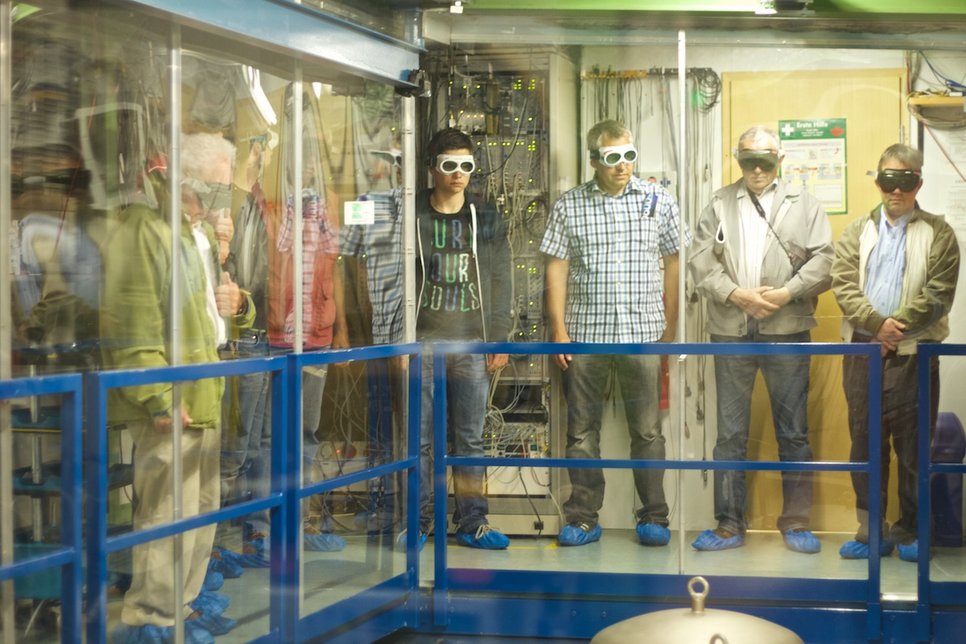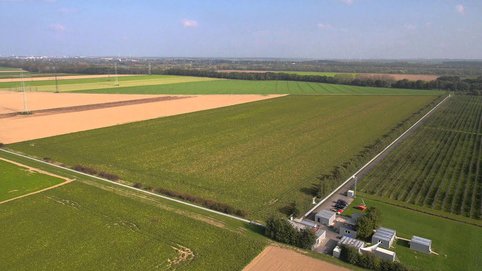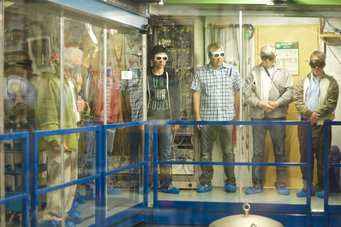Visit GEO600!
Registration for special tours now open
Since the direct measurement of the first gravitational wave, there has been enormous interest in visiting the gravitational wave detector GEO600 in Ruthe. Researchers at the Max Planck Institute for Gravitational Physics (Albert Einstein Institute/AEI) and the Leibniz Universität Hannover are now offering special tours between April and July.
Friday, 08 April 2016, 3 p.m. (fully booked)
Friday, 22 April 2016, 3 p.m. (fully booked)
Friday, 29 April 2016, 3 p.m. (fully booked)
Friday, 13 May 2016, 3 p.m. (fully booked)
Friday, 27 May 2016, 3 p.m. (fully booked)
Friday, 3 June 2016, 3 p.m. (fully booked)
Friday, 17 June 2016, 3 p.m. (fully booked)
Friday, 24 June 2016, 3 p.m. (fully booked)
Friday, 1 July 2016, 3 p.m. (fully booked)
Bitte melden Sie sich für die Führungen bis spätestens einen Tag vorher bei Dr. Benjamin Knispel per Email oder Telefon (0511-762-19104) an und warten Sie auf die Bestätigung durch das GEO600-Team.
Please indicate how many people will be participating in the tour and which tour you would like to attend. Please note that, for reasons of laser protection, children under 16 years cannot enter the GEO600 central building.
The tours last around 60 minutes (maximum 90 minutes) and, in addition to an introduction to Einstein’s gravitational waves, include a tour of the detector site, which provides many glimpses behind the scenes of a cutting-edge research facility, and a general explanation of the principle behind the functioning of gravitational wave detectors like the GEO600.
Getting there
The GEO600 site can be reached by public transport to Ruthe followed by a short walk, or by car. Detailed directions can be found on the GEO600 homepage.
Open Day 2016

As in 2014 and 2015, a GEO600 Open day is planned for this year. It will probably take place on a Saturday. The date will be announced nearer the time.
GEO600’s contributions to the first direct measurement of gravitational waves
GEO600 is located in Ruthe near Sarstedt around 20 kilometres south of Hannover. The project is designed and operated by researchers from the Max Planck Institute for Gravitational Physics and the Leibniz Universität Hannover together with partners from Scotland and England under the auspices of the GEO collaboration. GEO600 is funded by the German Federal Ministry of Education and Research, the Federal State of Lower Saxony, the Max Planck Society, the Science and Technology Facilities Council, and the Volkswagen Foundation.
GEO600 is part of a worldwide network of gravitational wave detectors and acts as an ideas factory and test bench for cutting-edge detector technologies. Most of the key technologies that contributed to the previously unattained sensitivity of Advanced LIGO (aLIGO) and enabled the discovery were developed and tested by the GEO collaboration. Examples include signal enhancement, resonant sideband extraction and monolithic mirror suspensions. Moreover, together with colleagues from the Laser Zentrum Hannover e.V., AEI researchers also developed the aLIGO high performance laser systems and installed them on the detector. The lasers play a crucial role in the high-precision measurements.

